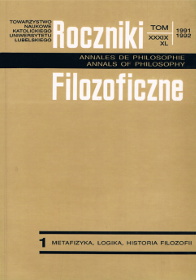Wolność, sprawiedliwość, prawda, miłość − program dla Polski
Abstrakt
John XXIII contained his programme for the world in the title of the encyclical on peace. In it he recommended observing the truth, justice, love and freedom. When these recommendations are considered in their proper, anthropological context, the conclusion can be drawn that Christ and wisdom are a programme for the world, for every man, and hence for Poland.
This conclusion may be justified by referring to the ontic structure of man as a person and to the main currents of Polish culture.
Persons establish the relation of love with people and God which is expressed in humanism and religion. Owing to humanism as faithfulness to people, to their existence, truth and good, man acquires competence in being guided by wisdom. Owing to religion understood as real personal relationship with God, man becomes united with Christ through love, as it is only in Christ, in His person, that God renders Himself accessible to man. For this reason wisdom and Christ give us the most favourable connections: through wisdom − always with the truth and good, and through Christ with God.
Clinging to humanism and religion is consistent with the tendencies and structure of the Polish culture. Our culture and at the same time history really started taking shape from the moment of Poland’s Christianization. The Christianization bound us in a real way with God by Christ’s sacramental power. In the field of this real connection with God our state and our Catholicism, as well as the history of Poland and Polish culture were developed by love towards God and people.
In choosing wisdom and Christ people are aided by truth, justice, love and freedom.
From realistic identification of people, their personal relations, the connections between man’s intellect and the truth as well as his will and the good, one can draw the conclusion that people’s and nations’ most precious good is wisdom and Christ, a just and interesting programme for Poland.
Copyright (c) 1992 Roczniki Filozoficzne

Utwór dostępny jest na licencji Creative Commons Uznanie autorstwa – Użycie niekomercyjne – Bez utworów zależnych 4.0 Międzynarodowe.





